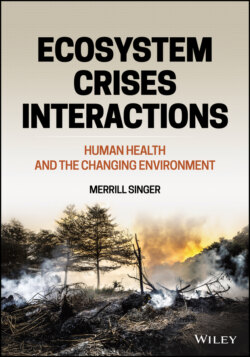Читать книгу Ecosystem Crises Interactions - Merrill Singer - Страница 18
1.4 Global warming or climate change?
ОглавлениеAnthony Leiserowitz is a Senior Research Scientist and Director of the Yale Program on Climate Change Communication. His research investigates the psychological, cultural, and political factors that influence environmental beliefs, attitudes, support of policy, and human behavior. His scholarly work is widely published and often cited by his peers. He is invited regularly to speak at scholarly conferences and concerned citizen meetings, and with CEOs and politicians on climate issues. After he gives an address, one of the most common questions he encounters is: “Is it global warming or climate?” (Christensen 2019). Both of these terms have become familiar to people around the world in the last 25 years, but is one of them more accurate or preferred?
The climate is changing and Earth is warming. In fact, however, neither term fully captures the entangled set of significant atmospheric and environmental changes that stem from the release of greenhouse gases (e.g., ocean acidification) or other changes such as the effects of black carbon pollution on solar reflection. Warming of the planet certainly is the force driving a complex array of transformations taking place around us, but the everyday understanding of warming does not adequately describe the erratic nature of what is occurring, nor does it quite encompass the sudden and ever more frequent occurrence of extreme weather events, including extreme cold spells. The world is not just increasing in temperature—weather is becoming less stable, less predictable, weirder, and more deadly in various ways (Climate Central 2012). And while it is accurate to say that the climate is changing, this has been the case for the whole history of Earth (Brooke 2014). What is critical is the clear pattern of that change (an uptrend in average annual temperature) over the last 150 years since the beginning of the Industrial Revolution, and especially the last 50, and our own role in pushing that change. Moreover, climate‐related changes are not occurring in isolation from other dramatic planetary changes resulting from human activity. In short, it is not all about warming or climate. Both terms only cover part of the contemporary problem of environmental/climate turmoil (Baer & Singer 2018).
The first recognition of the relationship between carbon dioxide in the atmosphere and atmospheric temperature dates to the work of Swedish scientist Svante Arrhenius (winner of the Nobel Prize in Chemistry), who in 1896 linked what would come to be called the greenhouse effect to the use of fossil fuels. Of historical note, early on Arrhenius “strongly advocated remedies to stop the indiscriminate waste of fossil energy and chemical resources, oil, gas and coal” (Arrhenius et al. 2008). By the 1970s, the connections among fossil fuel burning, CO2 emission, and climate were becoming clear to scientists, and the terms “global warming” and “climate change” were becoming increasingly frequent in the scientific literature. Both terms began to filter into the mass media during the 1990s, and then into everyday discourse. In the contemporary scientific literature, “climate change” is generally used unless the focus is on the pattern of increase in Earth’s surface temperature. Those who deny or downplay the changes that are occurring on Earth tend to prefer “global warming,” however, as it allows them to argue during extreme cold events that surely the planet cannot be warming, just step outside your front door—or, in the case of Senator James Inhofe of Oklahoma, author of The Greatest Hoax (2012), bring a snowball on to the floor of the U.S. Senate (Bump 2015). In Inhofe’s view, it is a “scientific scandal … to make it sound like man is responsible for all these things [i.e., climate change]” (MSNBC 2015).
In this book, both terms are used, but it is with the understanding that there is a need for a broad picture of the patterns of change, the components of change, the causes of change, the consequences of change, and, most especially, the interactions at the heart of the vast changes occurring around and because of us.
